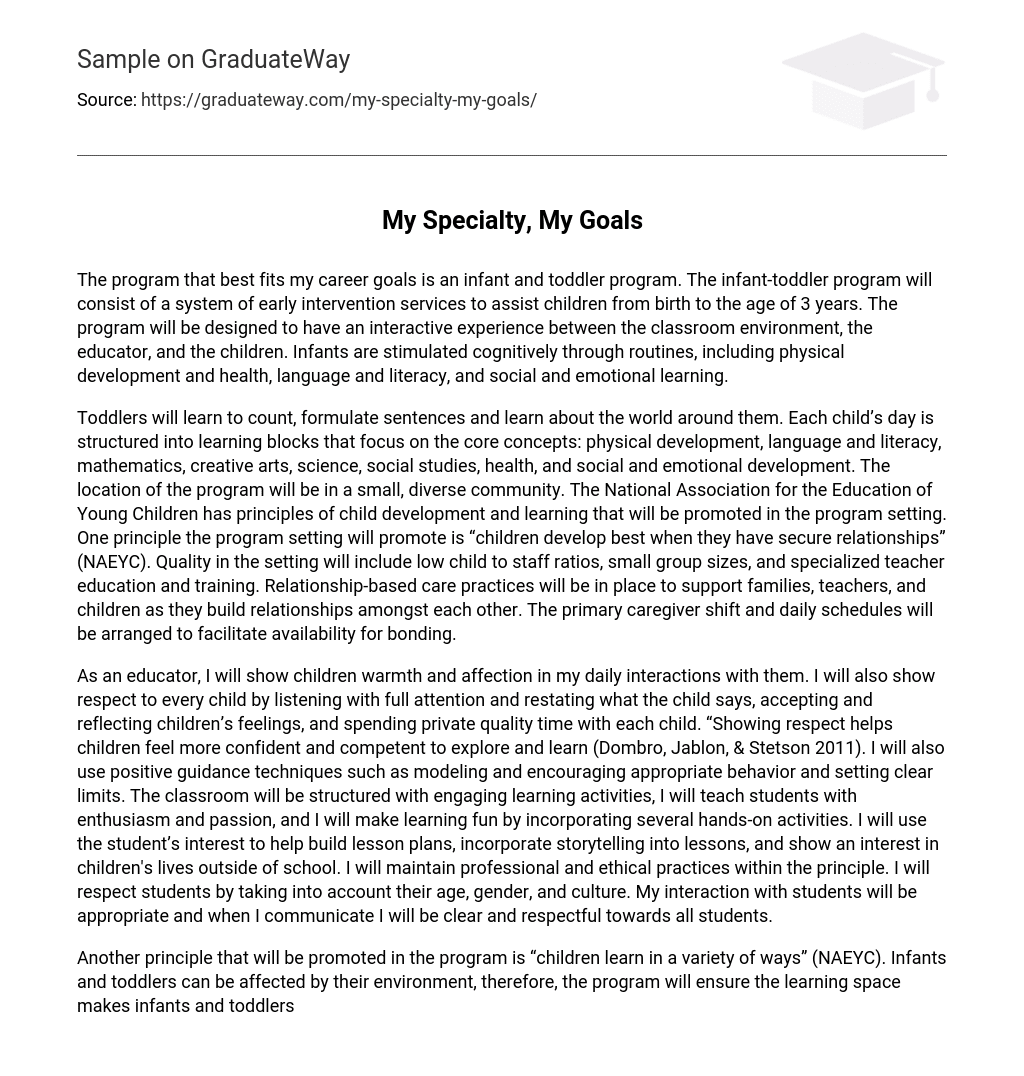The program that best fits my career goals is an infant and toddler program. The infant-toddler program will consist of a system of early intervention services to assist children from birth to the age of 3 years. The program will be designed to have an interactive experience between the classroom environment, the educator, and the children. Infants are stimulated cognitively through routines, including physical development and health, language and literacy, and social and emotional learning.
Toddlers will learn to count, formulate sentences and learn about the world around them. Each child’s day is structured into learning blocks that focus on the core concepts: physical development, language and literacy, mathematics, creative arts, science, social studies, health, and social and emotional development. The location of the program will be in a small, diverse community. The National Association for the Education of Young Children has principles of child development and learning that will be promoted in the program setting. One principle the program setting will promote is “children develop best when they have secure relationships” (NAEYC). Quality in the setting will include low child to staff ratios, small group sizes, and specialized teacher education and training. Relationship-based care practices will be in place to support families, teachers, and children as they build relationships amongst each other. The primary caregiver shift and daily schedules will be arranged to facilitate availability for bonding.
As an educator, I will show children warmth and affection in my daily interactions with them. I will also show respect to every child by listening with full attention and restating what the child says, accepting and reflecting children’s feelings, and spending private quality time with each child. “Showing respect helps children feel more confident and competent to explore and learn (Dombro, Jablon, & Stetson 2011). I will also use positive guidance techniques such as modeling and encouraging appropriate behavior and setting clear limits. The classroom will be structured with engaging learning activities, I will teach students with enthusiasm and passion, and I will make learning fun by incorporating several hands-on activities. I will use the student’s interest to help build lesson plans, incorporate storytelling into lessons, and show an interest in children’s lives outside of school. I will maintain professional and ethical practices within the principle. I will respect students by taking into account their age, gender, and culture. My interaction with students will be appropriate and when I communicate I will be clear and respectful towards all students.
Another principle that will be promoted in the program is “children learn in a variety of ways” (NAEYC). Infants and toddlers can be affected by their environment, therefore, the program will ensure the learning space makes infants and toddlers feel secure and welcome. The learning environment will provide the flexibility that supports child-directed practices, exploration, curiosity, and motivation for learning. The environment will be emotionally supportive: well-organized, dependable, and flexible. “An emotionally supportive environment helps prepare infants and toddlers for learning” (Bagdi & Vacca, 2005). As the educator, I will maintain professional and ethical practices while helping children to learn in a variety of ways. I will seek to understand the student’s academic, personal and social needs. I will use developmentally appropriate assessments to determine what ways children learn best then apply it in my teaching techniques. I will respect that each child develops at his or her own pace. I will model appropriate interactions and respect the limitations of very young children.
The materials and equipment indoor and outdoor meet the developmental needs of each child in a safe and healthy manner. I will use my knowledge of child development and each individual child’s interest to provide individual age-appropriate activities for infants and toddlers. The daily schedule will provide opportunities for children to choose from various activities based on their own interests and care routines. In addition to the previous principles, the program will promote play. “Play is an important vehicle for developing self-regulation and promoting language, cognition, and social competence” (NAEYC). The program will have a play-based foundation for helping children to learn. As the educator, I will expand play and encourage more complex thinking for an idea or technique and making connections to real life. I will also allow children to partake in undirected play so they may learn how to work in groups, share, and resolve conflicts. Children will also participate in unstructured play. “Encouraging unstructured play may be an exceptional way to increase physical activity levels in children, which is one important strategy in the resolution of the obesity epidemic” (American Academy of Pediatrics 2006).
I will maintain professional and ethical practices with this principle by understanding children’s exploration through play reflects the wide-ranging and varied interest and therefore should be included in the curriculum framework. The program setting will also promote the principle “Development and learning advance when children are challenged





